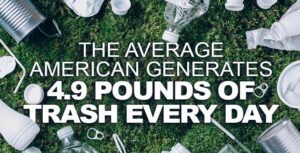
The United States stands out as one of the world’s largest producers of waste. In 2018, the nation generated approximately 292.4 million tons of municipal solid waste, averaging about 4.9 pounds per person each day. Annually, this amounts to nearly 1,800 pounds per individual.
Composition of Waste: The waste generated encompasses various materials, with significant portions attributed to:
-
Food Waste: Approximately 30.63 million tons annually.
-
Plastics: Around 26.82 million tons.
-
Paper and Paperboard: About 18.35 million tons.
-
Metals: Roughly 13.8 million tons.
-
Wood: Approximately 12.14 million tons.
-
Textiles: Around 11.15 million tons.
-
Yard Trimmings: About 8.65 million tons.
-
Glass: Approximately 6.87 million tons.
-
Rubber and Leather: Around 4.95 million tons.
-
Miscellaneous Inorganic Waste: About 3.25 million tons.
-
Other Materials: Approximately 2.98 million tons.
Environmental Impact: The substantial waste production has profound environmental consequences. Landfills are rapidly reaching capacity, with projections indicating that the U.S. may run out of landfill space by 2036. Moreover, plastic waste poses a significant threat, as it can persist in the environment for over 400 years, leading to long-term pollution challenges.
Global Context: Despite comprising only 4% of the global population, the U.S. is responsible for 12% of the planet’s trash. This disproportionate contribution underscores the need for improved waste management practices and a shift towards more sustainable consumption patterns.
Strategies for Waste Reduction: Addressing this issue requires collective action. Individuals can contribute by:
-
Recycling: Properly sorting and recycling materials to divert waste from landfills.
-
Composting: Turning organic waste into nutrient-rich soil amendments.
-
Reducing Single-Use Items: Opting for reusable bags, bottles, and containers to minimize plastic waste.
-
Supporting Sustainable Products: Choosing products with minimal packaging or made from recycled materials.
By adopting these practices, individuals can play a pivotal role in mitigating waste production and promoting environmental sustainability.
This information was acquired from multiple sources and credit is provided using Google Search.
